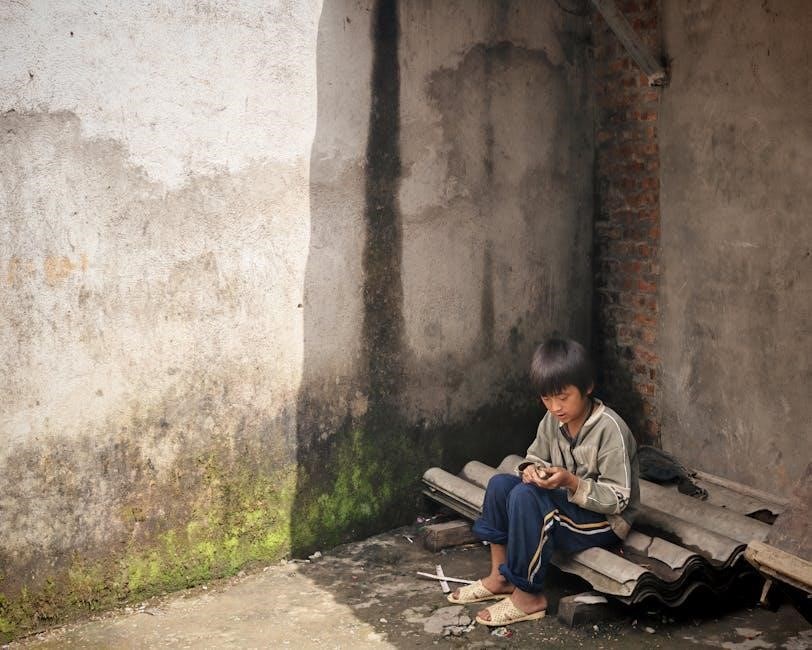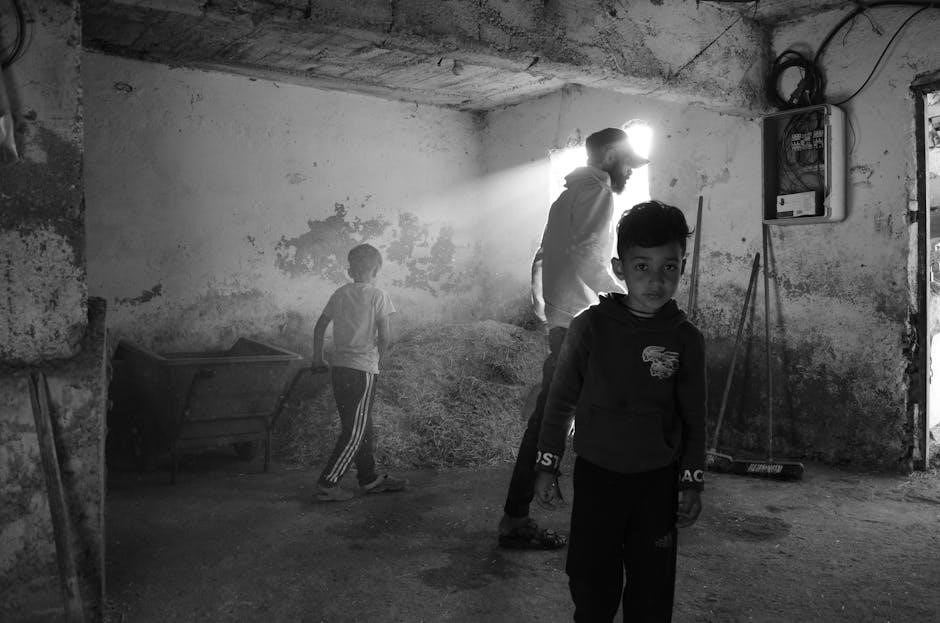
god of carnage play pdf
Background of the Play
God of Carnage, written by Yasmina Reza, is a dark comedy that satirizes bourgeois manners. It won the Tony and Olivier Awards for its biting social critique.
1.1. The Playwright: Yasmina Reza

Yasmina Reza is a French writer and playwright, acclaimed for her biting social dramas. Born in Paris, she gained international recognition with God of Carnage, which won the Tony and Olivier Awards. Her works often explore human nature, societal norms, and interpersonal conflicts. Reza’s sharp wit and satirical style have made her a prominent figure in contemporary theatre, with plays like Art and God of Carnage showcasing her ability to blend humor with profound commentary on modern life.
1.2. The Play’s Origin and Inspiration
God of Carnage was inspired by the breakdown of social contracts and the primal instincts lurking beneath civilized behavior. Reza drew from real-life observations of human interactions, crafting a story where a simple meeting between two couples escalates into chaos. The play explores how adults, tasked with resolving a conflict between their children, reveal their true selves. Reza’s inspiration lies in the duality of human nature, blending humor with a stark commentary on societal norms and the fragility of polite discourse.
1.3. The Simple yet Provocative Setup
The play unfolds in a single, intimate setting—a living room—where two couples meet to discuss a conflict between their children. This minimalist setup amplifies the tension, forcing the audience to focus on the characters’ interactions. The real-time dialogue drives the story, revealing how quickly civility crumbles. Reza’s choice of a confined, realistic space heightens the emotional intensity, making the audience complicit in the unraveling of social norms and the exposure of raw human behavior beneath the polite facade.
Plot Summary
The play centers on two couples meeting to discuss a fight between their sons. Initially polite, their conversation escalates, revealing underlying tensions and leading to chaos.
2.1. The Meeting of Two Couples
The play opens with the Raleighs and Novaks meeting in the Raleighs’ elegant home. The atmosphere is tense but polite as they gather to discuss their sons’ altercation. Veronique, a refined woman, and Michel, her husband, host Annette and Alain Novak, who seem uneasy. The initial small talk hides underlying animosity, setting the stage for a clash of egos and values. The meeting begins with forced civility, but the cracks in their facade soon become apparent.
2.2. The Incident Between the Children
The play revolves around a violent confrontation between two young boys, Bruno and Ferdinand. Bruno, the son of the Raleighs, loses two teeth during a fight with Ferdinand, the Novaks’ son. This incident sparks the meeting of their parents, who attempt to resolve the matter civilly. However, the boys’ altercation serves as a catalyst for the adults’ escalating tensions, revealing the thin line between childish aggression and adult hypocrisy.
2.3. The Deterioration of Civility
The meeting of the two couples begins with polite conversation but quickly unravels into chaos. As the discussion progresses, the adults’ civility crumbles, revealing their true, primal selves. What starts as a courteous debate over the children’s fight escalates into personal attacks, venomous dialogue, and a complete breakdown of decorum. The play masterfully portrays how thinly veiled societal norms and politeness can disintegrate under stress, exposing raw emotions and latent aggression.
Themes and Symbolism
Explores societal norms, human duality, and latent violence, using the confined living room as a metaphor for escalating tensions and the impossibility of escaping inner truths.
3.1. The Breakdown of Social Contracts
The play examines how societal norms crumble when individuals prioritize self-interest over collective harmony. The meeting of two couples, initially polite, deteriorates into chaos, revealing the fragility of civilized behavior. Reza highlights how quickly the facade of politeness can erode, exposing underlying savagery. This breakdown mirrors the failure of social contracts, where mutual respect and cooperation give way to primal instincts, illustrating the thin line between civility and barbarism in human interactions.
3.2. Violence and Aggression in Civilization
The play explores the inherent violence lurking beneath civilized facades. Set in a refined living room, the characters’ polite demeanor gradually gives way to verbal sparring and physical intimidation. Reza illustrates how societal norms fail to suppress primal instincts, as adults regress into childish aggression. This mirrors the savage impulses hidden beneath human civility, exposing the thin line between order and chaos in supposedly enlightened society.
3.3. The Illusion of Maturity
The play strips away the veneer of adulthood, revealing how quickly civilized individuals revert to childish behavior. The characters’ supposed maturity crumbles as they prioritize petty grievances over resolving the conflict. Reza highlights the illusion of emotional growth, showing how adults, like children, act impulsively and selfishly. This mirrors the futility of societal expectations, as the characters’ regression exposes the fragility of adult composure and the enduring presence of primal instincts in civilized life.

Key Characters
The play revolves around four main adults and their children, exploring their interactions and dynamics. The characters’ civilized facade gradually fades, revealing their true selves and primal instincts.
4.1. The Raleighs: Veronique and Michel
Veronique, a cultured art dealer, and Michel, a self-made businessman, embody sophistication and refinement. Their polished exterior, however, cracks as tensions rise, exposing their true selves. Veronique’s controlling nature surfaces, while Michel’s detachment turns into aggression, revealing the cracks in their relationship. Their interactions with the Novaks highlight their struggle to maintain civility, ultimately unraveling their facade of maturity and decorum.
4.2. The Novaks: Annette and Alain
Annette and Alain Novak, a wealthy couple, initially present themselves as polite and composed. However, as the conversation progresses, their true personalities emerge. Annette, a homemaker, becomes increasingly anxious and struggles to maintain civility, while Alain, a dismissive and arrogant wealth manager, reveals his disdain for the situation. Their interactions with the Raleighs expose underlying tensions and social hypocrisies, adding depth to the play’s exploration of human nature and societal facade.
4.3. The Children: Bruno and Ferdinand
Bruno and Ferdinand, the sons of the Novaks and Raleighs, respectively, are central to the play’s conflict. Bruno’s aggressive behavior and Ferdinand’s reaction spark the tension. Their actions reveal the primal instincts and lack of accountability often seen in children, mirroring the adults’ eventual descent into chaos. Through their roles, Reza highlights the illusion of maturity and the thin line between civilized behavior and raw human nature.
Reza’s Writing Style
Reza’s writing blends dark humor, sharp satire, and intense dialogue, creating a gripping exploration of human behavior and societal norms through psychological depth and witty exchanges.
5.1. Dark Humor and Satire
Reza masterfully employs dark humor and satire to critique societal norms, using the characters’ absurdity to highlight human hypocrisy. The play’s witty dialogue and ironic situations create a comedic yet unsettling atmosphere, exposing the thin line between civilization and primal behavior. By mocking bourgeois etiquette, Reza delivers a sharp commentary on modern society’s superficiality, making the audience laugh while reflecting on their own flaws. This blend of humor and critique makes the play both entertaining and thought-provoking.
5.2. Dialogue-Driven Narrative
The play’s narrative is propelled entirely by dialogue, with minimal stage directions, creating a dynamic and intimate atmosphere. Reza’s sharp, realistic conversations reveal character psychology and escalate tensions naturally. The absence of lengthy descriptions forces the audience to focus on the verbal sparring, making the dialogue a powerful tool for both humor and drama. This approach ensures a fast-paced, engaging narrative that mirrors real-life interactions, keeping the audience captivated and invested in the characters’ unraveling civility.
5.3. Psychological Depth
Reza masterfully explores the inner workings of her characters, exposing their primal instincts and true selves. The play delves into the complexities of human behavior, revealing how quickly civilized individuals can revert to childish, aggressive tendencies. Through subtle dialogue and actions, the characters’ insecurities, biases, and hidden desires surface, creating a profound psychological portrait. This depth allows audiences to reflect on their own behaviors, making the play a compelling exploration of human nature and societal expectations.

Critical Reception
God of Carnage received widespread critical acclaim for its sharp dialogue and psychological depth, winning the Olivier Award for Best Comedy and a Tony Award for Best Play.
6.1. Awards and Accolades
God of Carnage garnered significant recognition, winning the Olivier Award for Best Comedy in 2009 and the Tony Award for Best Play in 2009. It also received the Laurence Olivier Award and was nominated for six Tony Awards, further solidifying its acclaim. The play’s success was celebrated globally, with numerous productions earning critical praise and audience admiration, cementing its place as a modern theatrical masterpiece.
6.2. Reviews and Audience Response
God of Carnage received widespread critical acclaim for its sharp dialogue and intense character dynamics. Audiences praised the play’s ability to blend dark humor with uncomfortable truths about human behavior. Theatregoers found the premise relatable, as it exposed the hypocrisy beneath polite social interactions. Many noted how the play’s tension kept them on the edge of their seats, making it a memorable theatrical experience. Its universal themes resonated deeply, fostering lively post-show discussions and debates.

6.3. Comparisons to Other Works
God of Carnage is often compared to works by Edward Albee, particularly Who’s Afraid of Virginia Woolf?, for its exploration of marital tension and societal masks. Similarities to Molière’s satirical plays are also noted, as both critique bourgeois hypocrisy. Reza’s sharp dialogue and psychological depth evoke comparisons to Harold Pinter’s tense dramatic encounters, while her dark humor aligns with the absurdism of contemporary theatre. These parallels highlight her unique yet familiar storytelling style.

Adaptations and Performances
God of Carnage has been adapted into the film Carnage (2011), directed by Roman Polanski. The play has seen numerous stage productions worldwide, featuring notable actors like Jodie Foster and John C. Reilly.
7.1. Stage Productions Worldwide

God of Carnage has been performed in numerous theaters globally, achieving acclaim in major cities like London, New York, and Paris. Its debut in 2008 at London’s Gielgud Theatre was a massive success. The play has also thrived in the U.S., with a Broadway production in 2009 featuring notable actors like Marcia Gay Harden. Its sharp dialogue and intense dynamics resonate with diverse audiences, making it a favorite for both intimate and large-scale productions worldwide.
7.2. Audiobook Version
The audiobook version of God of Carnage offers a compelling listening experience, capturing the play’s tense dialogue and emotional depth. Narrated by a talented cast, it brings the characters’ dynamics vividly to life. Available on platforms like Audible, Google Play Books, and Apple Books, the audiobook provides an intimate way to engage with Reza’s sharp wit and the characters’ escalating conflict. It’s a popular choice for fans who enjoy immersive storytelling on the go.
7.3. Notable Casts and Directors
The play has attracted renowned actors and directors, enhancing its appeal. Notable casts include Jodie Foster, Matthew Broderick, and Sarah Jessica Parker in Broadway productions. Roman Polanski directed the film adaptation, bringing his unique style to the story. These high-profile involvements have elevated the play’s reputation, drawing audiences worldwide and solidifying its place in contemporary theater.

Availability of the Play
The play is widely available on platforms like Amazon, Google Books, and eBay in paperback, eBook, and audiobook formats, accessible to global audiences.
8.1. PDF Downloads and eBooks
God of Carnage is easily accessible as a PDF download or eBook through major online retailers like Amazon, Google Books, and Barnes & Noble. The play is available in formats such as PDF, ePub, and Kindle, making it compatible with various devices. Many platforms offer free previews, allowing readers to sample the content before purchasing. Additionally, some websites provide free PDF versions, though users should be cautious of copyright infringement. This digital accessibility ensures the play remains widely readable and engaging for audiences worldwide.
8.2. Purchase Options on Amazon
God of Carnage can be purchased on Amazon in various formats, including paperback, Kindle, and audiobook. The paperback edition is widely available, often with free delivery for Prime members. The Kindle version offers a convenient digital copy, while the audiobook provides an immersive listening experience. Amazon also features customer reviews and ratings, helping buyers make informed decisions. Prices vary depending on the format and seller, ensuring options for different budgets and preferences.
8.3. Free Scripts and Excerpts
Free scripts and excerpts of God of Carnage can be found on various online platforms, though availability may vary. Some websites offer preview chapters or sample scenes for educational purposes. Additionally, certain script repositories provide partial access to the play. Users can search for “God of Carnage script PDF free” or “God of Carnage excerpts” to explore these options. Always ensure compliance with copyright laws when accessing such materials.
Educational and Analytical Resources
Study guides, academic articles, and discussion questions provide deep insights into God of Carnage, helping students and scholars analyze its themes, characters, and societal commentary.
9.1. Study Guides and Analysis

Detailed study guides for God of Carnage offer in-depth analysis of themes, characters, and dramatic structure. These resources explore Reza’s use of satire and psychological tension, providing insights into the breakdown of civility. Analysis often focuses on character motivations, such as Veronica’s perfectionism and Annette’s instability. Themes like social contracts and the illusion of maturity are also examined. These guides are invaluable for students and theater enthusiasts seeking to understand the play’s complexity and cultural relevance.
9.2. Academic Articles and Essays
Scholarly articles and essays on God of Carnage delve into its thematic richness and psychological complexity. Academics often analyze Reza’s exploration of bourgeois hypocrisy, the dissolution of social norms, and the primal instincts lurking beneath civilized facades. Essays frequently discuss the play’s dialogue-driven structure and its effectiveness in revealing character flaws. These writings also examine the cultural critiques embedded in the narrative, offering insights into how Reza’s work reflects and challenges societal expectations. Such analyses provide deeper understanding of the play’s enduring relevance.
9.3. Discussion Questions
Discussion questions for God of Carnage often focus on its themes and character dynamics. Examples include: How does the play portray the breakdown of civility? What role does parenting play in the conflict? How does social class influence the characters’ behaviors? What does the play suggest about human nature? How do the characters’ interactions reveal their true selves? What message do you think Reza is conveying about modern society? These questions encourage deeper analysis and reflection on the play’s significance.

Cultural and Social Impact
God of Carnage critiques bourgeois society, exposing the hypocrisy and primal instincts lurking beneath polished exteriors. Its razor-sharp dialogue reflects human nature’s darker aspects, resonating universally.
10.1. Commentary on Bourgeois Society
God of Carnage delivers a scathing critique of bourgeois society, exposing the hypocrisy and primal instincts beneath its polished facade. Through the unraveling civility of two middle-class couples, Reza strips away the veneer of sophistication, revealing raw human emotions. The play challenges societal expectations of decorum and highlights the fragility of civilized norms, offering a biting satire of modern urban elites and their moral pretensions.
10.2. Reflection of Human Nature
God of Carnage mirrors fundamental aspects of human nature, unveiling the inherent flaws and primal instincts beneath polished exteriors. The play portrays how quickly civility crumbles, exposing selfishness, aggression, and irrationality. Through the characters’ escalating conflicts, Reza reveals universal truths about humanity’s capacity for both cooperation and destruction, highlighting the thin line between order and chaos in human behavior.
10.3. Relevance in Modern Times
God of Carnage remains strikingly relevant, as its exploration of human conflict and societal tensions resonates deeply in today’s polarized world. The play’s themes of primal behavior, masked by civility, reflect contemporary issues like social media-driven conflicts and political divisiveness. Its biting commentary on bourgeois hypocrisy and the fragility of human relationships continues to captivate audiences, proving Reza’s work timeless in its insight into modern societal dynamics and human psychology.